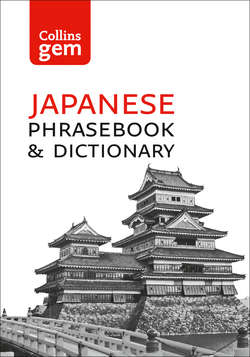Читать книгу Collins Gem - Collins Dictionaries - Страница 10
ОглавлениеHello/goodbye, yes/no
In Japanese there is no exact equivalent for the word ‘hello’ – different greeting words are used based on the time of the day. Similarly, the word chotto (whose literal meaning is ‘a bit’) is influenced by body language: if said with one’s head slightly tilted, it means ‘no’.
| Hello | こんにちはkonnichiwa |
| Good morning | おはようございますohayoo gozaimasu |
| Good evening | こんばんはkombanwa |
| Good night | おやすみなさいoyasuminasai |
| Goodbye | さようならsayoonara |
| See you later | じゃまたja mata |
| See you tomorrow | また明日mata ashita |
| How are you? | お元気ですかogenki desu ka? |
| Fine, thanks | はい、元気ですhai, genki desu |
| And you, Mr/Ms...? | ...さんは...san wa? |
| Please | お願いしますonegai shimasu |
| Thank you | ありがとう (ございます)arigatoo (gozaimasu) |
| You’re welcome | どういたしましてdoo itashimashite |
| Excuse me! | ごめんなさいgomennasai! |
| Sorry! | すみませんsumimasen! |
| Yes | はいhai |
| No | いいえiie |
| Um... | ちょっと…chotto... |
| Yes, please | はい、お願いしますhai, onegai shimasu |
| No, thanks | いいえ、結構ですiie, kekkoo desu |
| Sir… | …氏…shi |
| Mr…/Madam…/Mrs…/Ms…/Miss… | …さん…san |
| I don’t understand | わかりませんwakarimasen |
| I don’t speak Japanese | 私は日本語を話せませんwatashi wa nihongo o hanasemasen |
| England/English | イングランド/イングランド人ingurando/ingurando-jin |
| Scotland/Scottish | スコットランド/スコットランド人sukottorando/sukottorando-jin |
| Wales/Welsh | ウェールズ/ウェールズ人weeruzu/weeruzu-jin |
| Ireland/Irish | アイルランド/アイルランド人airurando/airurando-jin |
| USA/American | アメリカ/アメリカ人amerika/amerika-jin |
| Australia/Australian | オーストラリア/オーストラリア人oosutoraria/oosutoraria-jin |
Bowing おじぎ ojigi
Japanese people bow to express their respect and appreciation. People bow along with greetings, words of appreciation or apologies. The strength of the respect, gratitude or apology, dictates how low your bow should be.
